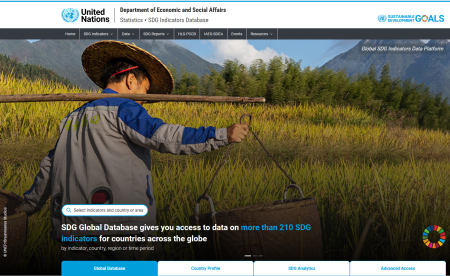ACTIONS
- Protect and safeguard cultural and natural heritage
- Learning and educational opportunities
- Cultural participation/social inclusion
- Sustainable tourism
- Support research
- Employment (recruiting, training, safety)
- Energy consumption, greenhouse gas emissions
- Waste management and reduction
- Transport (forms of, energy use)
- Commercial activities including copyright and IP
- Governance and management
- Security, disaster preparedness, risk reduction
- External partnerships and collaborations
- Sign-post to other resource (database)
- Country profiles on SDGs
SDG Indicators Database
- United Nations (DESA)
SDG Global Database gives you access to data on more than 210 SDG indicators for countries across the globe by indicator, country, region or time period.
You can access 132 country profiles and track the progress on global sustainable goal.
SDG Analytics is available across 17 goals, more than 200 indicators and more than 200 countries, areas or regions. View Data availability, Global and regional trends, Compare trends of one series by areas, Compare trends of multiple series by one area.
Advanced Access to SDG Data: Get programmatic access to download the data and build your own visualizations and apps.
Avaiable in
- English
SDGs LINKAGES
The resource can support SDG targets related to education and access to information, including 4.7 (Education for Sustainable Development), 12.8 (information for sustainable development and lifestyles in harmony with nature), 13.3 (climate education and awareness) and 16.10 (protect access to information) in particular, as well as providing information on a wide range of additional targets and indicators.
Click on the SDG Target to discover Our Collections Matter indicators
-
Our Collections Matter indicators:
- Numbers of people in each type of programme drawing on collections from different demographic groups.
- Increases in numbers of people in each type of programme from different demographic groups.
- Proportion of people involved in such programmes in relation to overall audience size.
- Evidence that learners have acquired knowledge and skills to promote sustainable development.
-
Our Collections Matter indicators:
- Extent to which (i) global citizenship education and (ii) education for sustainable development (including climate change education) are mainstreamed in (a) national education policies; (b) curricula; (c) teacher education; and (d) student assessment.
- Extent to which global citizenship education and education for sustainable development (including climate change education) are mainstreamed in formal, informal and non-formal education programmes and activities drawing on and related to collections.
-
Our Collections Matter indicators:
- Plans in place to enhance positive contributions to addressing climate change through use of collections. Plans in place to ensure collections, collections institutions and broader society can adapt effectively to climate change.
- Plans in place for effective education and awareness raising on climate change mitigation, adaptation, impact reduction and early warning.
- Plans in place to reduce negative contributions of collections-related functions, e.g. measuring greenhouse emissions with plans and targets in place to reduce them.
-
Our Collections Matter indicators:
- Adopt and implement constitutional, statutory and/or policy guarantees for public access to information.
- Plans in place, and plans implemented to enhance public access to information relating to collections.
- Plans in place, and plans implemented to support fundamental freedoms, in line with human rights, national and international agreements and legislation.
- Plans and procedures in place for public access to information relating to the operation and management of collections-based institutions.
- Complaint mechanism in place for public to use where public access to information and fundamental freedoms not supported or fulfilled.

